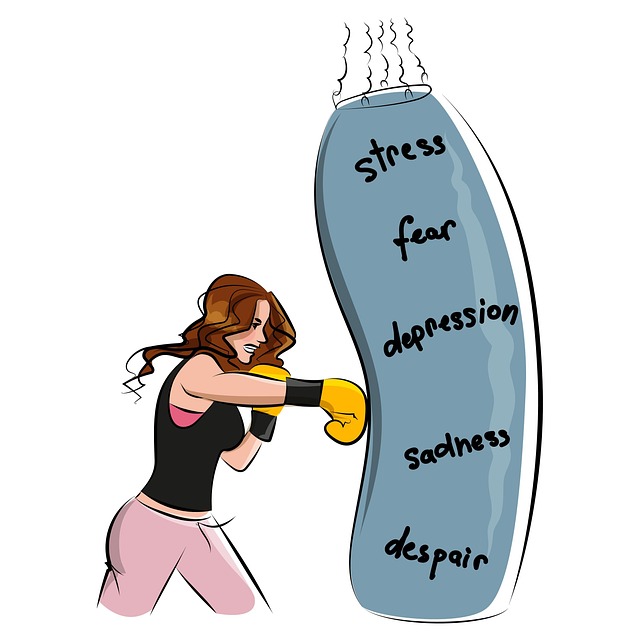Broomfield Chronic Pain Therapy offers workshops focusing on stress management through understanding and modifying its effects on health. Combining mental wellness journaling, coping strategies from recognized programs, and self-care routines, these workshops break the stress-chronic pain cycle. They emphasize individual Coping Skills Development, mindfulness exercises, and self-advocacy in mental health policy, fostering holistic stress reduction techniques and community support. Success is measured through attendee feedback and long-term well-being improvements, aiming to prevent burnout among healthcare providers while promoting sustainable caregiving practices within the community.
Stress management workshops are an effective way to empower individuals in navigating life’s challenges. This article explores the comprehensive approach taken by the Broomfield Chronic Pain Therapy organization, specializing in stress relief techniques. We’ll delve into understanding the impact of stress on well-being and present their unique method inspired by Broomfield’s expertise. From workshop design and environment creation to measuring success, discover how these sessions foster long-term mental health benefits, offering a supportive sanctuary for participants’ transformation.
- Understanding Stress and Its Impact on Well-being
- The Broomfield Chronic Pain Therapy Approach to Stress Management
- Designing Effective Workshop Content: Techniques and Activities
- Creating a Supportive Environment for Participants
- Measuring Success and Long-term Benefits of the Workshops
Understanding Stress and Its Impact on Well-being

Stress is an inevitable part of modern life, but understanding its insidious nature and impact on our well-being is key to effective management. Chronic stress, in particular, can lead to a range of physical and mental health issues, including increased risk of heart disease, high blood pressure, anxiety, and depression. This is where Broomfield Chronic Pain Therapy’s workshops step in as a valuable resource for individuals seeking to navigate the challenges of daily stressors.
By participating in these workshops, attendees gain insights into the body’s stress response system and learn practical tools to recognize and manage stress triggers. Mental Wellness Journaling Exercise Guidance is often incorporated to encourage self-reflection and emotional awareness. Additionally, programs designed by Mental Health Education Programs focus on teaching coping strategies tailored to individual needs, fostering a sense of control and promoting Self-Care Routine Development for Better Mental Health.
The Broomfield Chronic Pain Therapy Approach to Stress Management

The Broomfield Chronic Pain Therapy Approach to Stress Management offers a unique perspective on tackling stress by focusing on its connection with chronic pain conditions. This method recognizes that stress and pain are intricately linked, often exacerbating one another in a vicious cycle. By employing evidence-based practices, participants learn effective coping strategies tailored to their experiences with chronic pain. The program delves into various techniques, including mindfulness exercises, relaxation methodologies, and Social Skills Training, empowering individuals to manage their stress levels proactively.
One of the key aspects is Coping Skills Development, which equips attendees with a toolkit to navigate stressful situations. This includes teaching them how to identify triggers, modify environments, and adopt healthy behaviors. Additionally, the approach encourages self-advocacy within the context of mental health policy analysis and advocacy, fostering an understanding of personal rights and resources available for better stress management in the long term.
Designing Effective Workshop Content: Techniques and Activities

Effective workshop content for stress management should be tailored to engage participants and equip them with practical tools. Begin by incorporating Self-Awareness Exercises that encourage introspection, such as mindfulness meditation or journaling prompts, to help individuals recognize their unique stress triggers. These exercises can be especially beneficial in a Broomfield Chronic Pain Therapy context, where managing stress is crucial for overall well-being.
Variety is key when designing activities for stress reduction. Include interactive discussions on Stress Reduction Methods, role-playing scenarios for navigating high-stress situations, and group exercises that foster collaboration and support. Incorporating these diverse techniques within a Mental Health Education Programs Design framework ensures participants gain a holistic understanding of stress management and leave with actionable strategies to tackle daily stressors effectively.
Creating a Supportive Environment for Participants

Creating a supportive environment is key to the success of any stress management workshop. At Broomfield Chronic Pain Therapy, we understand that participants need a safe and non-judgmental space to learn and grow. To achieve this, our workshops are designed with a focus on inclusivity and comfort. We encourage an atmosphere where individuals feel empowered to share their experiences and learn from one another, fostering a sense of community.
This supportive setting allows for the development of essential coping skills and mood management techniques. By creating a harmonious environment, we enable participants to engage in open dialogue about stress-related topics, which is crucial for effective risk management planning. Our goal is to empower attendees with tools that enhance their mental health and overall well-being, ensuring they leave the workshop feeling supported and equipped to manage stress effectively.
Measuring Success and Long-term Benefits of the Workshops

Measuring the success of stress management workshops is a crucial step in understanding their impact on participants’ lives. The long-term benefits of such initiatives can be substantial, especially when focusing on chronic pain therapy in Broomfield. By implementing structured evaluation methods, organizers can assess the effectiveness of the workshops. This involves collecting feedback from attendees through surveys or interviews, tracking their progress over time, and measuring improvements in emotional well-being promotion techniques.
Beyond immediate workshop outcomes, the true success lies in the prevention of burnout among healthcare providers and trauma support services. These professionals often bear significant stress, so effective workshops can contribute to their resilience and overall well-being. By fostering healthy coping mechanisms, participants may find better ways to manage stress, leading to improved job satisfaction and a more sustainable approach to caregiving in Broomfield’s chronic pain therapy settings.
Stress management workshops, grounded in the Broomfield Chronic Pain Therapy approach, offer powerful tools for enhancing well-being. By combining education on stress understanding, evidence-based techniques, and a supportive environment, these workshops empower participants to navigate life’s challenges more effectively. Through measured success and demonstrated long-term benefits, such programs can revolutionize mental health support, fostering resilience and improved quality of life for all who participate.














